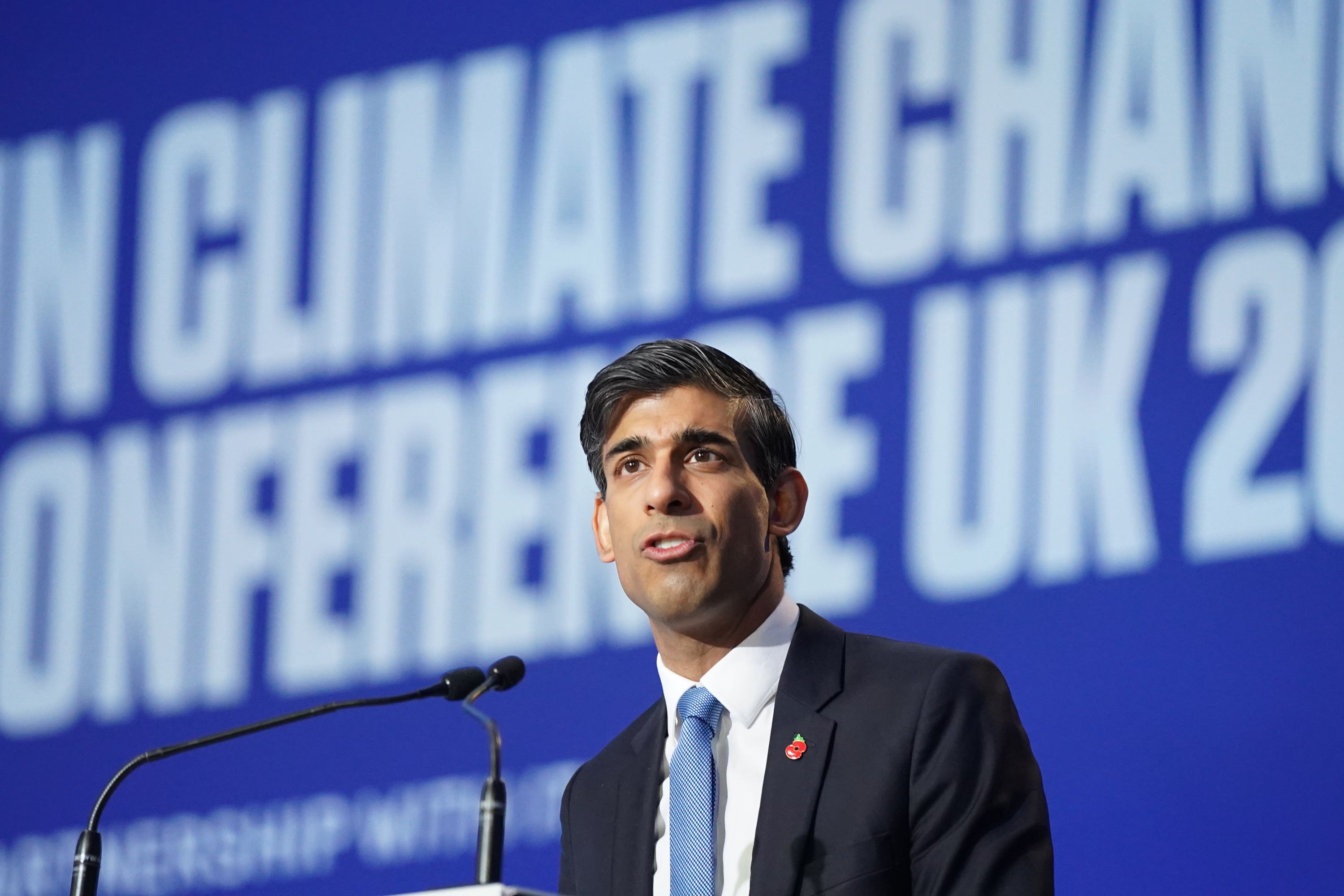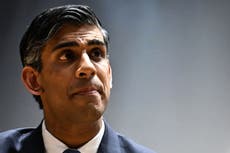The Independent's journalism is supported by our readers. When you purchase through links on our site, we may earn commission.
Desperate Rishi Sunak is showing his true colours – and they don’t include green
The prime minister is sacrificing his party’s eco agenda as part of a general lurch to the right – but vacating the centre-ground is fraught with electoral danger, writes Andrew Grice


The contours of the Conservatives’ campaign at next year’s general election are emerging earlier than they expected. Rishi Sunak had intended to move up a gear in the autumn – a tacit admission that his five pledges on the economy, NHS and small boats remain undelivered and have failed to close Labour’s 20-point lead in the opinion polls.
Then the Tories’ unexpected victory in the Uxbridge and South Ruislip by-election handed Sunak a precious dividing line with a reformed Labour Party. The deciding issue – the expansion of London’s ultra-low emission zone – was a public health rather than environmental issue, but the £12.50-a-day charge was an irresistible opportunity to paint Labour as the party that will charge ordinary people for going green.
So, despite the wildfires raging on the continent and the hottest July on record, Sunak has posed as a net-zero sceptic. He is trying to have his cake and eat it: the government’s main policies have not changed yet, even if his language has got harder. Yesterday, Sunak told LBC radio he “cares” about leaving the environment in a better state than his government found it, but insisted this must be done “in a proportionate and practical way”.
Crucially, Tory strategists believe they can extend this “divide and rule” strategy to show Labour on the wrong side of public opinion on other issues. A crime bill, with tougher sentences for shoplifting, burglary, theft and common assault, will be included in the King’s speech in November. Other areas will include migration, trans rights and what Tories call the “woke capitalism” highlighted by the de-banking of Nigel Farage.
This will be coupled with far more aggressive attacks on Labour in general and Keir Starmer in particular. Last week, Sunak bracketed Labour with criminal gangs and solicitors accused of making up life stories for asylum seekers; it seemed out of character, but is the shape of things to come.
On the face of it, Sunak is lurching to the right, and leaving himself open to the charge of vacating the centre ground where elections are usually decided. So his move is fraught with danger.
His manoeuvre is designed to mobilise the Tories’ core vote, which rests heavily on those aged over 50. Many are disillusioned and among the “don’t knows” in the opinion polls. Those who, if they haven’t gone over to Labour yet, might be persuaded back into the Tory column by an energetic campaign based on traditional conservative values. “We have nowhere else to go, other than to fire up the base,” one Tory adviser admitted to me ruefully.
However, such an approach could alienate liberal conservatives who rather like Sunak – and certainly prefer him to Boris Johnson and Liz Truss. Despite Sunak’s support for Brexit, he is liked by many Remainers in this group.
Tory MPs on the party’s left fear these voters and the under-50s generally could react to a right-wing tilt by switching to Labour or the Liberal Democrats, costing the Tories seats in the blue wall in the south. They believe culture wars will not reap electoral rewards – pointing out that voters are not interested in issues such as trans rights. They worry, rightly, that banging on about relatively marginal issues will be viewed by the public as a deliberate diversion from those at the top of voters’ concerns – the cost-of-living crisis and the NHS.
Tory moderates, who have lost influence and been marginalised since the high-water mark of David Cameron’s leadership, fear Sunak’s more aggressive tone will make the Tories look like “the nasty party” again – the label used by Theresa May in 2002 which paved the way for Cameron’s modernising project.
“I don’t think Rishi will be able to carry this off; he is not a natural attack dog,” a One Nation Tory MP told me. “Many voters like ‘reasonable Rishi’; they will see that this is not authentic.”
Yet the Tory left may have misjudged the PM. Events have cast him as a moderate, masking his fiscal and social conservatism. He was defined by his leadership battle against Truss, with some right wingers ludicrously branding him a socialist. After succeeding Truss, Sunak’s competence and pragmatism was (wrongly) seen by Tory moderates as evidence he was “one of us”. Now, perhaps, he is showing his true colours – and they do not include green.
Tory climate sceptics, for whom opposing net zero measures fills the void after their crusade to leave the EU, welcome Sunak’s move towards them. However, his right-wing MPs will be very hard to please. Those who wanted to leave the EU were on the fringes of the party for years; later they became the tail that wagged the dog. Right wingers, their appetites whetted by Sunak in recent days, will now try to repeat the trick. But they will make his life hell when he doesn’t agree to all their demands, whether on net zero (where they are pressing for the 2030 ban on new petrol and diesel cars to be delayed), the small boats or tax cuts.
Sunak needs to perform a very tricky balancing act. If he fails, he might end up satisfying no one and falling between two stools – angering right-wing voters and MPs by raising expectations he can’t keep while making the Tories look like “the nasty party” to liberals and voters worried about the climate.
Where does Sunak’s gambit leave Labour? Senior figures claim to be unworried by what by what one called “a desperate diversion” by a PM who cannot defend the Tories’ record after 13 years in power, and happy Starmer will dominate the centre ground if Sunak veers right.
Some Labour insiders spy an opportunity for Labour to own the green agenda now Sunak has ended the bipartisan approach to net zero. They point to polls showing 71 per cent support for the net zero target, but Labour should take note that 55 per cent believe carbon reducing policies should be introduced only if they do not result in extra costs for ordinary people.
There are risks for Labour in Sunak’s pitch: he will argue that the world is changing fast on issues like climate but that change must be managed sensitively. He will portray Labour as wanting to go too fast, too soon, and taking a dictatorial, statist approach – for example, by wanting to punish motorists.
Sunak allies deny he is vacating the centre ground, insisting that ending the “war on motorists” puts him with the mainstream opinion in middle Britain. Yet appealing for the motorists’ vote will have its limitations. As one Labour strategist told me: “It is not nearly as big or deep as they [the Tories] might imagine. It is not going to outweigh the more profound disenchantment people feel about the state of the country and the Tories’ loss of purpose.”
However, Labour cannot risk looking anti-motorist. “This could come across as petty, even vindictive,” the strategist said.
The challenge for Starmer is to take and occupy the green higher ground, showing leadership for a proportionate climate policy, without allowing the Tories to portray Labour’s eco-warriors as waging a vendetta. While Labour’s green wing will urge Starmer to be bolder, his caution will likely prevail; he will have to sidestep the many Tory traps laid for him between now and the election.
It is clear Sunak will throw the kitchen sink at Labour and it is bound to inflict some damage. But tacking right and going negative will not work unless it is accompanied by a positive offer, particularly for the under-50s. There is no sign of that yet; Sunak desperately needs to outline one this autumn. While such an approach might limit the scale of the Tory losses next year, it is unlikely to prevent his party’s defeat on the key issues of the economy and public services.






Join our commenting forum
Join thought-provoking conversations, follow other Independent readers and see their replies
1Comments